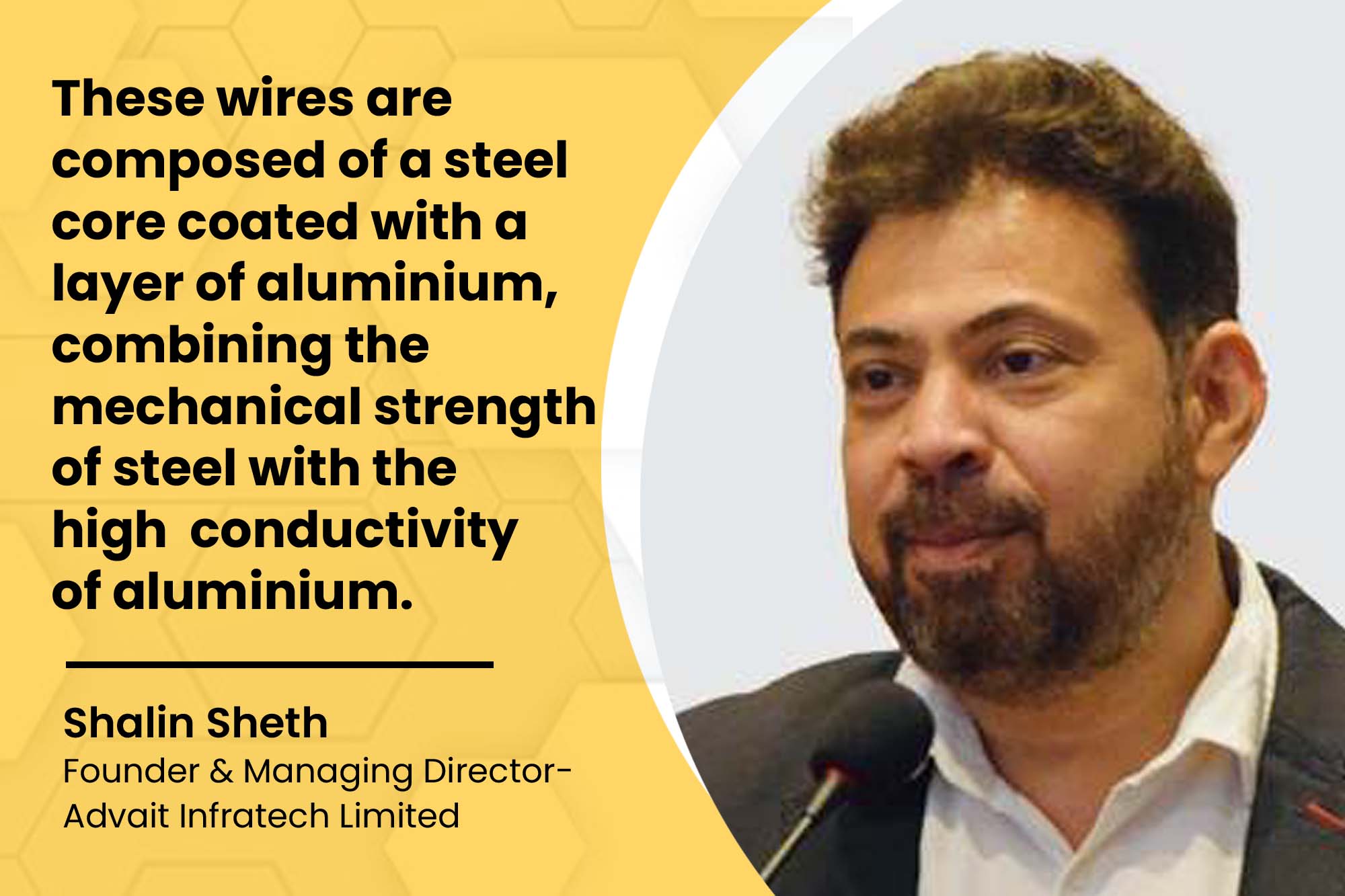Why ACS wire is optimal for overhead transmission lines?
By EPR Magazine Editorial December 26, 2023 12:08 pm IST
By EPR Magazine Editorial December 26, 2023 12:08 pm IST

These wires are composed of a steel core coated with a layer of aluminium, combining the mechanical strength of steel with the high conductivity of aluminium.
In the electrical power transmission realm, the infrastructure’s efficiency and reliability play a pivotal role in ensuring a stable and continuous supply of electricity. Overhead transmission lines have been a traditional and widely adopted method for transporting electricity over long distances. The conductor or wire is a critical element influencing both efficiency and reliability among the various components that make up these power lines. This article delves into the significance of Aluminum-Clad Steel (ACS) wire in overhead transmission lines, exploring how it enhances efficiency and contributes to the overall reliability of the power grid.
Understanding overhead transmission lines
Overhead transmission lines are the network of conductors supported by towers or poles that transmit electrical power from generating stations to distribution points or directly to consumers. These lines are distinguished by their ability to cover vast distances with minimal energy loss. The key components of these transmission lines include conductors, insulators, towers, and grounding systems. The conductor, responsible for carrying the electric current, is particularly important.
Efficiency and conductivity of ACS wire
The choice of conductor material significantly influences the efficiency of an overhead transmission line. ACS wire, composed of a steel core coated with a layer of aluminium, combines the mechanical strength of steel with the high conductivity of aluminium. This unique composition results in a conductor that exhibits improved efficiency in power transmission.
Aluminium is an excellent conductor of electricity, allowing for the efficient flow of electrical current through the wire. The global overhead conductor market, where ACS wire plays a significant role, was valued at around USD 22.4 billion in 2022 and is expected to reach USD 35.2 billion by 2027, growing at a CAGR of 7.6 percent. This indicates a healthy demand for ACS wire, driven by infrastructure development and increasing electricity consumption. However, aluminium has its limitations in terms of mechanical strength. Including a steel core in ACS wire addresses this issue, providing the necessary strength and durability to withstand the mechanical stresses imposed by wind, ice, and other environmental factors. This combination makes ACS wire optimal for overhead transmission lines, ensuring electrical conductivity and structural integrity.
Reduced thermal expansion and contraction
Temperature fluctuations can significantly impact the performance of overhead transmission lines. The expansion and contraction of materials due to temperature changes can lead to sagging or stretching of the conductors, affecting the overall stability of the transmission system. With its steel core, ACS wire exhibits reduced thermal expansion and contraction compared to conventional aluminium conductors. This characteristic helps maintain the proper tension in the lines, minimising the risk of sagging and ensuring reliable power transmission even under varying environmental conditions.
Corrosion resistance and longevityThe longevity of overhead transmission lines is critical in ensuring a reliable and cost-effective power distribution network. ACS wire, with its aluminium coating, offers exceptional corrosion resistance. This resistance is particularly crucial in areas with harsh weather conditions, high humidity, or exposure to corrosive substances. The protective layer of aluminium prevents rust and corrosion, extending the lifespan of the conductor and reducing the frequency of maintenance and replacements.
Enhanced mechanical strength
The mechanical strength of ACS wire, derived from its steel core, contributes to the overall robustness of overhead transmission lines. The steel core provides the necessary support to withstand the mechanical stresses induced by wind, ice loading, and dynamic line conditions. This enhanced strength not only improves the structural integrity of the transmission system but also reduces the risk of conductor breakage or damage, minimising downtime and improving the overall reliability of the power grid.
Environmental considerations
In addition to its technical advantages, ACS wire also presents environmental benefits. Using aluminium, a highly recyclable material, aligns with sustainable practices in the power industry. Recycling aluminium requires significantly less energy than primary aluminium production, contributing to a reduction in carbon emissions and environmental impact. The recyclability of ACS wire supports the industry’s efforts to move towards greener and more sustainable practices.
To conclude, the role of ACS wire in overhead transmission lines cannot be overstated. Its unique composition, combining aluminium’s conductivity with steel’s strength, results in a conductor that enhances the efficiency and reliability of power transmission. In this landscape of advancing power transmission technologies, Advait Infratech’s commitment to precision and innovation shines through in the production of ACS wire. Their state-of-the-art manufacturing facility ensures the seamless integration of aluminium and steel, reinforcing the vital role ACS wire plays in fostering a resilient and sustainable power grid for the evolving demands of the future. As the demand for electricity grows, investing in technologies like ACS wire becomes paramount for building a robust and efficient power grid that can meet present and future needs.
Spokesperson:Shalin Sheth, Founder & Managing Director- Advait Infratech Limited
We use cookies to personalize your experience. By continuing to visit this website you agree to our Terms & Conditions, Privacy Policy and Cookie Policy.